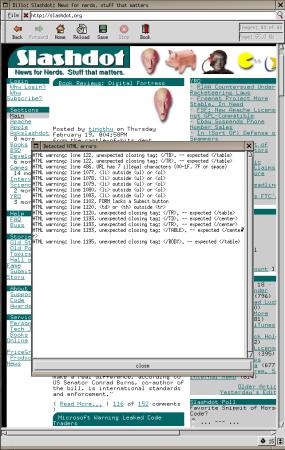Embeddable browser project hits milestone release, seeks funding
Feb 19, 2004 — by LinuxDevices Staff — from the LinuxDevices Archive — viewsThe Dillo project to build a small, fast, lightweight, standards-compliant embeddable Web browser has released a new version with “the largest set of improvements, ever,” according to project founder Jorge Cid. Dillo 0.8 includes a better, daemon-based plug-in architecture and several new plugins, among other new features. The project, which has found its way into numerous embedded Linux based gadgets, continues to seek funding and corporate feature sponsors.
Daemon-based plug-in architecture
Dillo's plug-in architecture has adopted a daemon architecture that enables the addition of features as external processes without increasing the core Dillo footprint. The modular architecture also simplifies feature additions for developers, who need no knowledge of Dillo internals, according to Cid.
A number of plugins have been completed, including downloads (using wget, for multiple connection support), ftp, hello, and bookmarks. The plugin daemon also enables Dillo to be used as a GUI for some applications (see below) according to Cid.
“From the user's perspective, [the new “dpid” daemon] means it will be easier to develop and include new dpis (dillo plugins) starting from this release. The “sexy” one we'll be working on for the next release is https, and most probably a GUI version of the downloads plugin will be also included,” commented Cid.
Using Dillo as a GUI
According to CID, embedded developers can use Dillo as a GUI to control other applications on the system. “One of the main strengths of dpi is that making any-to-html filters becomes the natural way of extending dillo's usage scope (a simple concept similar to CGI). Embedded developers can use Dillo as a GUI by sending HTML, and taking the actions selected by the user (just as the bookmarks plugin works now).”
Cid continues, “The dpi program is an independent process running under the OS; it has all the power the OS allows it. For instance you can control an external device by linking a dpi with the library that controls the device, and get your GUI user interface by sending HTML to Dillo and reacting to it.”
Bug-meter and other new features
Dillo has always featured verbose HTML error reporting to standard error when launched from a command-line interface (CLI), and the new release takes this feature one step further with an integrated “bug-meter” showing a count of HTML errors on a given page, their line numbers, and hints how to resolve them. More details about bug-meter are available here.

Dillo's “bug-meter” showing HTML errors on Slashdot
(Click for larger view)
Other new features include a context menu for images, web-search dialog, support for X “-geometry” switches when launched from a CLI, improvements to the internal widget system, portability enhancements, and bug fixes.
Additionally, Cid says Dillo remains a highly secure and privacy-oriented browser. Unlike browsers that cache data to local filesystems, Dillo maintains a page and image cache in memory. This also permits it to run effectively on a read-only filesystem, according to Cid.
Funding woes and roadmap
Cid reports that Dillo has had difficulty obtaining funding, in part because the project is based in Chile, where channels for funding technology development are limited largely to the educational system. Furthermore, highly publicized corruption in the educational grants program (Cid suggests googling for “+MOP +CIADE +CHILE”) has stymied educational technology grants for more than a year.
Cid says several companies have contacted him about sponsoring feature additions, but have failed to follow through with actual funding. For example, one large German airline was interested in funding CSS (Cascading Style Sheet) support, but balked at the estimated 36,000 Euro cost to fund two developers half time for six months.
Features that Cid is interested in working on include support for secure HTTP, a GUI for downloads, preferences, better FTP support, additional any-to-HTML filters for things like man and info pages, support for frames, i18n (internationalization), and antialiasing (“maybe with a port to FLTK”).
“The only unexplored funding channel I've not yet tried is to ask for donations at the web site,” notes Cid. “I find it quite ironic that an effort to democraticize access to the internet [Dillo runs well on extremely old PC equipment of the kind frequently donated to schools and organizations aimed at narrowing the digital divide. –ed] can end up being funded by the same people that need it. Very romantic though!”
Dillo in the wild
Asked about big companies using Dillo, Cid encouraged companies to contact the project about optimizing Dillo for specific applications, such as small display screens. Cid listed the following products currently using Dillo:
- Encore simputer (“this pdf file shows dillo!”)
- Picopeta simputer
- Yopi 3500
- Yopy 3700
- A “large German airline” that distributes Dillo as an attachment with HTML documents to overcome the problem of showing data reports over multiple platforms
Some other free software projects that use Dillo include:
- GooseQuill (integrated suite for writers — “uses Dillo extensively”)
- sylpheed-claws (email agent — uses Dillo to display HTML email”)
- gnu-darwin (“the 'most free' software distribution — uses Dillo in its core”)
- familiar (embedded distro for iPaqs)
For more details about the Dillo project, be sure to read this LinuxDevices.com article by project founder Jorge Cid.
This article was originally published on LinuxDevices.com and has been donated to the open source community by QuinStreet Inc. Please visit LinuxToday.com for up-to-date news and articles about Linux and open source.